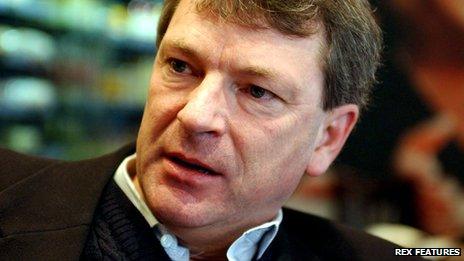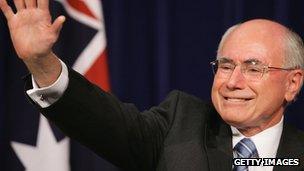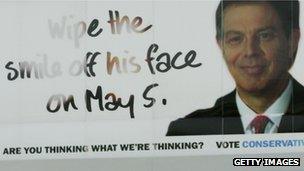Lynton Crosby: Can he win the next election for David Cameron?
- Published

Mayor of London Boris Johnson urged David Cameron to hire Lynton Crosby
They call Lynton Crosby the Wizard of Oz - the political magician who has been hired by the Conservatives to mastermind their next election campaign.
Like the wizard, Crosby is a shadowy figure, and some people say he is not all he is cracked up to be - after all, the last time he fought a general election for the Tories, they lost.
But he has had his notable successes, too, both in his home country of Australia, and most recently running a successful re-election campaign for Mayor of London Boris Johnson.
Lynton Crosby was born 55 years ago on a farm in rural South Australia. His father was not a natural farmer - he was musical and artistic - and soon he moved the family to the nearby town of Kadina, where he set up an arts and crafts shop.
By all accounts, Crosby had a very happy - and quite indulged - childhood.
"Mum and Dad adored him. They did anything for him," says Robyn Hewett - one of his two older sisters.
"At primary school, he loved debating. He was easy-going and friendly and he just used to love putting on plays and performing in the shed to other children. And very academic, I guess you'd say."
Australian success
Nothing was too much when it came to looking after the young Lynton. When he got into Adelaide University to read economics, his parents moved to the city to be near him. And, although they were not particularly political, like most rural folk, they were instinctive supporters of the Liberals - Australia's conservative party.

Lynton Crosby helped John Howard win four consecutive elections in Australia
Perhaps then it was not too surprising that after a spell working in the private sector, Crosby moved into Liberal politics - and fell in love with it.
He was not much good as a candidate though. As he puts it, he managed to turn a marginal seat into a safe Labour one and later admitted "with hindsight, I wouldn't have voted for me."
Instead Lynton Crosby switched to the backroom, ending up as campaign director for Australia's Liberal Prime Minister John Howard.
"I think he's a very professional political campaigner. He's just interested in making sure that the party he supports wins," Mr Howard told BBC Radio 4's Profile.
"As a party leader of long-time standing, I can only say that's exactly the sort of mentality you want from somebody who is your principal campaign manager."
Crosby managed to win four consecutive elections for John Howard, but critics claimed he used some dubious tactics: so called "dog-whistle" campaigns that appealed to people's basest instincts on crime and immigration - and "wedge" issues, which force the opposition to defend an unpopular policy.
"His company's website describes him, with a certain amount of pride, I think, as a 'master of the dark arts of politics,'" says Cheryl Kernot, a former Australian Senator who has been on the receiving end of several of Crosby's campaigns.
"I remember most vividly the 10 years that he was masterminding conservative campaigns here, and the focus on refugees and asylum seekers, and the exploitation of basic instincts of fear of difference, and latent prejudice," Kernot recalls.
"There's nothing grubby about Lynton," counters John Howard.
"He's a tough campaigner. He's no more or less ruthless than any other effective campaigner. And this wedge nonsense [is] the bleating of people who didn't like the Liberal Party winning in Australia."
2005 General Election
However, similar criticisms were levelled at Crosby when he came over to Britain to help Michael Howard's Conservatives in the 2005 campaign.

Crosby was behind the Conservative's 'are you thinking what we're thinking?' campaign in 2005
Daniel Finkelstein, now a Times columnist, then working for the Tory Party, was the man who first introduced Lynton Crosby to then Conservative leader Michael Howard.
"They immediately hit it off. Both of them are very obsessive about politics... I think Michael appreciated Lynton's ability to pick issues because that's the way that Michael thinks," Finkelstein says.
Crosby certainly brought focus and discipline to the Conservative campaign and he raised morale among party workers by awarding prizes every day for the best press release.
But slogans like: "How would you feel if a bloke on early release attacked your daughter?" were blamed for giving the Tories the reputation of the "nasty party". Conservative ads also had dog-whistle messages like "are you thinking what we're thinking?"
However, Crosby's fans - and there are plenty of them - claim that while his ads may be brutal, the man is far from uncivilised.
"The one thing that I think would be a mistake is to think of Lynton Crosby as a sort of crude, ball-busting Australian outsider. He is not an intellectually unsophisticated, crude campaigning person at all. He's a pretty clever guy," says Daniel Finkelstein.
When the Conservatives lost the 2005 election, Crosby said he had come in too late: "You can't fatten a pig on market day," he said - but he left enough admirers here in Britain for Boris Johnson to recall him for the 2008 London mayoral campaign.
London is naturally a Labour city, so it took some political acumen to persuade voters to elect a Tory mayor two terms in a row.
Crosby imposed discipline on Johnson, demanding that he take himself more seriously, and concentrate not just on his pet projects, but on issues that voters actually cared about - and he did not shy from telling truth to power.
"I remember once, it was the end of a very long day, I was absolutely exhausted and I had to give a speech to a bunch of Conservative councillors - this was the 2007/2008 campaign," recalls Boris Johnson.
"I was at the end of my tether - barely knew what I was talking about and I thought I'd done more or less a good job with these guys and got through it in one piece.
"I tottered out of the room and my phone buzzed with a text. It said 'crap speech, mate' - and that was very much his approach to candidate management."
Cameron's next campaign
Lynton Crosby is known for his earthy language, but his candid approach worked on Boris Johnson.
But Ken Livingstone - Boris Johnson's Labour opponent in both 2008 and 2012 - still feels sore about what he says was the negative personal campaigning Crosby masterminded against him.
"There was almost never a time when Boris was launching some great new idea or anything else like that. It was just a pretty unremitting series of personal attacks and negative campaigning," says Livingston.
It certainly worked, though. When Boris Johnson won again in London earlier this year, he told David Cameron that Crosby was just the man to help the Tories fight the next general election campaign and that he should "break the piggy bank" to hire him.
Although the recent appointment was not met with universal acclaim. Tory modernisers fear that Crosby will pander to the core vote, using issues like immigration and crime.
Daniel Finkelstein, himself a moderniser, thinks this is too simplistic a reading:
"I don't think he'll take the party away from the strategy the leader of the party wants to follow, providing David Cameron is clear enough about what that is. I think he will turn that into a disciplined strategy."
Labour and the Liberal Democrats will now be studying Crosby's techniques and working out their own defence against his dark arts.
"I had no doubt from the moment I lost to Boris this time round that Lynton Crosby would be brought in to run Cameron's re-election campaign," says Ken Livingstone.
"For Crosby to have been able to deliver a Tory victory in London when they were losing everything everywhere else is an endorsement, effectively.
"And I remember saying to Ed Miliband throughout our campaign, 'you know, really follow this one closely, because this is what you will be up against'."
Listen again to Radio 4's Profile of Lynton Crosby via the Radio 4 website or Profile podcast.
- Published18 November 2012
- Published7 November 2012